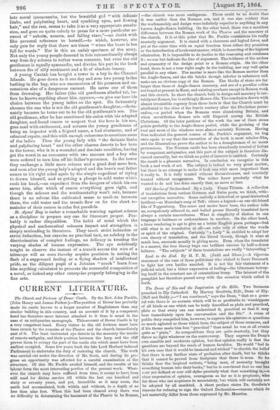The Doom of Sin and the Inspiration of the Bible.
Two Sermons preached in Ely Cathedral. By Harvey Goodwin, D.D., Dean of Ely. (Bell and Daldy.)--" I am convinced," says the Dean, "that as a gene- ral rule there is no sermon which will be so profitable to worshippers of all kinds as one which can be truly described as plain and practical, plain so that every one can understand it, practical so that it may bear immediately upon the conversation and the life." A sense of public duty compelled him, however, to express his opinions on questions so much agitated as those which form the subject of these sermons, and if his theme made him less "practical" than usual he was at all events quite as "plain." As compositions they are quite masterly, but they throw no light whatever on the controversy. They express the Dean's own sensible and moderate opinion, but that opinion really is that the questions are beyond the reach of human faculties. He would "feel in his own case that it would be immoral and wicked" to cherish the belief that there is any farther state of probation after death, but he thinks that it cannot be proved from Scripture that there is none. So he thinks that the inspired writers, "being men, of necessity brought something human into their books," but he is convinced that no one has e Ter yet defined or ever will define precisely what that something is,--a clear expression of opinion, courageous so far as it is prophetic, wise for those who can acquiesce in uncertainty, but which will certainly not be adopted by all mankind. A short preface states Dr. Goodwin's reasons for refusing to sign the Oxford Declaration—reasons which do not materially differ from those expressed by Mr. Maurice.






























 Previous page
Previous page